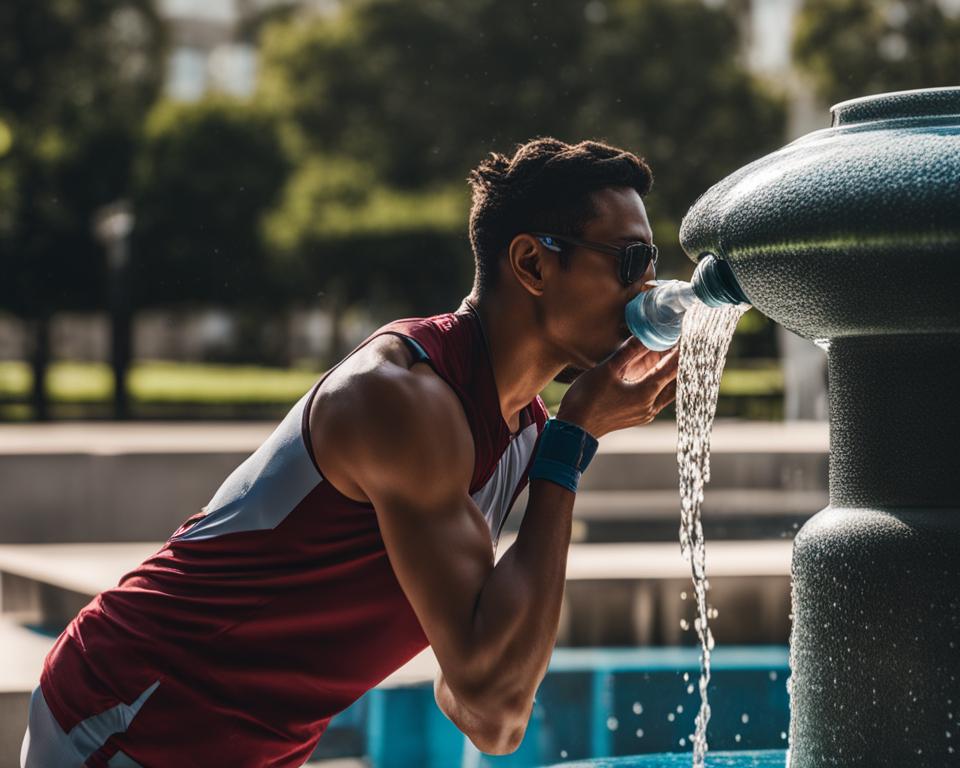In the world of sports, nutrition plays a crucial role in enhancing athletic performance. A well-designed sports nutrition plan can provide athletes with the fuel they need to excel in their respective sports. Whether you’re a professional athlete or simply enjoy staying active, understanding the best diet for athletes can help you achieve your performance goals.
Performance-based nutrition goes beyond healthy eating for athletes. It involves strategic meal planning, proper nutrient timing, and personalized approaches tailored to individual needs. With the guidance of a sports nutritionist or sports dietitian, athletes can optimize their nutrition for sports performance and gain a competitive edge.
Key Takeaways:
- Sports nutrition plays a vital role in optimizing athletic performance.
- A well-designed sports nutrition plan includes strategic meal planning and proper nutrient timing.
- Individualized approaches, guided by a sports nutritionist or sports dietitian, can help athletes reach their performance goals.
- Healthy eating for athletes goes beyond basic nutrition and involves specialized dietary strategies.
- By understanding and implementing performance-based nutrition, athletes can gain a competitive edge.
Nutritional Foundations for Enhancing Athletic Performance
In order to optimize athletic performance, it is crucial to establish solid nutritional foundations. By understanding the importance of macronutrients, hydration, and nutrient timing, athletes can fuel their bodies effectively and support optimal physical activity and recovery.
Macronutrients: Building Blocks for Energy and Recovery
Macronutrients, including carbohydrates, proteins, and fats, are the main sources of energy for athletes. Carbohydrates, in particular, provide the immediate energy needed for intense exercise, while proteins aid in muscle repair and growth. Fats play a role in energy reserves and certain metabolic functions.
It is essential to strike a balance between these macronutrients to ensure sustained energy levels and proper recovery. Athletes should work with sports nutritionists or registered dietitians to determine their individual macronutrient needs based on their activity level, body composition, and performance goals.
Hydration: Essential for Optimal Physical Activity
Proper hydration is vital for athletes to maintain performance, as even mild dehydration can negatively impact physical and cognitive function. Hydration needs vary depending on factors such as exercise intensity, duration, sweat rate, and environmental conditions.
Athletes should aim to consume adequate fluids throughout the day, not just during exercise. The American College of Sports Medicine recommends pre-hydration, consuming adequate fluids before exercise, and rehydration, replacing fluid losses after exercise, to optimize hydration levels.
Timing of Nutrient Intake: Synchronizing with Training Schedules
Timing nutrient intake is crucial for maximizing performance and recovery. The pre- and post-exercise periods are crucial for fueling and replenishing the body.
Before exercise, consuming a balanced meal or snack rich in carbohydrates can top up glycogen stores and provide readily available energy. After exercise, a combination of carbohydrates and proteins can help initiate muscle repair and replenish energy stores.
Additionally, nutrient timing should be synchronized with training schedules. Adjusting meal timing and composition to align with training sessions can optimize energy availability and recovery.
Carbohydrates: Fueling the Athlete’s Engine
Carbohydrates play a vital role in fueling an athlete’s engine and enhancing their performance. As a primary source of energy, carbohydrates provide the necessary fuel for endurance, power, and speed. Understanding the different types of carbohydrates and their roles in performance is essential for optimizing athletic performance.
Types of Carbohydrates and Their Roles in Performance
There are two main types of carbohydrates: simple carbohydrates and complex carbohydrates. Simple carbohydrates, also known as sugars, are quickly digested and provide a rapid source of fuel. They are beneficial for short bursts of intense activity and immediate energy needs. Foods rich in simple carbohydrates include fruits, fruit juices, and sports drinks.
On the other hand, complex carbohydrates, such as whole grains, legumes, and vegetables, provide a slower and more sustained release of energy. They are ideal for endurance activities as they provide a steady supply of fuel throughout prolonged exercise sessions. Complex carbohydrates also contain fiber, which aids in digestion and helps maintain stable blood sugar levels.
Both types of carbohydrates have their place in an athlete’s diet. Combining simple carbohydrates for immediate energy and complex carbohydrates for sustained fuel can optimize performance and support overall athletic goals.
Pre-Event Carb Loading and Its Effectiveness
Carbohydrate loading, also known as carb loading, is a strategy used by athletes to maximize their glycogen stores before an important event. It involves consuming a high-carbohydrate diet in the days leading up to the competition, allowing the muscles to store additional glycogen as fuel.
Carb loading can be particularly effective for endurance athletes participating in events lasting longer than 90 minutes. By increasing glycogen stores, athletes can delay the onset of fatigue and maintain a higher level of performance for a more extended period.
However, it’s important to note that carb loading may not be necessary or appropriate for all athletes and sports. It is recommended to consult with a sports nutritionist or dietitian to determine the best approach for individual needs and goals.
Overall, carbohydrates are essential for fueling an athlete’s engine. By incorporating a balance of simple and complex carbohydrates into their diet and considering strategies such as carb loading when appropriate, athletes can optimize their performance and achieve their athletic goals.

Protein Power: Muscle Repair and Growth
Protein plays a crucial role in muscle repair and growth, making it an essential nutrient for athletes. When we exercise, our muscles undergo microscopic damage, and protein is necessary for repairing and rebuilding these tissues, aiding in recovery and promoting muscle growth.
Protein Intake Recommendations for Athletic Populations
To reap the benefits of protein for muscle repair and growth, athletes should ensure they are consuming adequate amounts in their diet. The recommended protein intake varies depending on factors such as body weight, training intensity, and overall goals. As a general guideline, it is recommended that athletes consume around 1.2-2 grams of protein per kilogram of body weight per day. This higher protein intake is necessary to support the increased muscle protein synthesis that occurs with exercise.
Additionally, it is important for athletes to distribute their protein intake evenly throughout the day. Rather than consuming a large amount of protein in one meal, spreading it out across multiple meals and snacks helps optimize protein utilization and absorption by the muscles.
Impact of Protein on Muscle Protein Synthesis After Exercise
After exercise, the body undergoes a process called muscle protein synthesis, where new muscle proteins are formed. Protein consumption is essential during this period as it provides the necessary amino acids to support muscle protein synthesis. Consuming protein-rich foods or supplements within the post-exercise window (around 30 minutes to 1 hour after exercise) can enhance muscle protein synthesis and facilitate muscle repair and growth.
By understanding the role of protein in muscle repair and growth, athletes can optimize their protein intake and enhance their athletic performance and recovery.
Fats in Athletic Performance: More than Just Energy Reserves
While carbohydrates are the primary fuel source for athletes, fats also play an important role in athletic performance. Fats serve as a concentrated source of energy, providing long-lasting fuel for endurance activities. Additionally, they play a crucial role in supporting various physiological processes that contribute to optimal athletic performance.
One key role of fats in athletic performance is their ability to act as a secondary energy source. When glycogen stores, which are primarily fueled by carbohydrates, become depleted during prolonged exercise, the body turns to fats for energy. This helps to sustain performance and prevent the onset of fatigue.
Furthermore, fats play a vital role in supporting the absorption of fat-soluble vitamins, such as vitamins A, D, E, and K, which are essential for various physiological functions. These vitamins contribute to bone health, immune function, and muscle recovery, all of which are crucial for athletes.
Moreover, fats are involved in the synthesis and transport of hormones, including those that play a role in muscle growth and repair. They also provide structural support to cell membranes and aid in the absorption of fat-soluble antioxidants, which help protect against exercise-induced oxidative stress.
It is important for athletes to maintain a healthy balance of fats in their diet. This includes consuming an adequate intake of essential fatty acids, such as omega-3 and omega-6 fatty acids, which have anti-inflammatory properties and support cardiovascular health.
While fats are an important component of an athlete’s diet, it is crucial to note that not all fats are created equal. Healthy fat sources include avocados, nuts, seeds, olive oil, and fatty fish like salmon. These fats provide valuable nutrients along with their energy content.
By understanding the role of fats beyond energy reserves, athletes can make informed dietary choices that optimize their athletic performance and overall health.
Micro-Optimization: Vitamins, Minerals, and Antioxidants
Micronutrients, including vitamins and minerals, play a crucial role in supporting optimal sports performance. These essential nutrients are involved in various physiological processes that directly impact an athlete’s performance and recovery.
Vitamins are organic compounds that are necessary for the body to function properly. They contribute to energy production, immune function, and overall health. In terms of sports performance, certain vitamins, such as vitamin C and vitamin E, act as antioxidants, protecting against exercise-induced oxidative stress.
Minerals, on the other hand, are inorganic substances that are vital for various bodily functions. They help maintain proper fluid balance, assist in muscle contractions, and support bone health. Important minerals for athletes include calcium, iron, and sodium.
Antioxidants play a crucial role in combatting exercise-induced oxidative stress, which can occur during intense physical activity. Exercise generates reactive oxygen species (ROS), which can cause cellular damage and impair performance. Antioxidants neutralize these harmful molecules, promoting recovery and reducing inflammation.
The Role of Micronutrients in Sports Performance
Micronutrients are involved in numerous processes that impact an athlete’s performance. Here are some key ways in which vitamins and minerals contribute to sports performance:
- Vitamin B complex (B1, B2, B3, B6, B12): These vitamins are essential for energy production and metabolism. They help convert carbohydrates, proteins, and fats into usable energy, providing the fuel needed for physical activity.
- Vitamin D: This vitamin plays a crucial role in calcium absorption and bone health. It is especially important for athletes who engage in high-impact activities that put stress on the bones.
- Iron: Iron is necessary for the production of hemoglobin, which carries oxygen to the muscles. Inadequate iron levels can lead to fatigue, decreased endurance, and impaired performance.
- Zinc: Zinc is involved in protein synthesis and immune function. It plays a role in muscle repair and recovery, helping athletes bounce back from intense training sessions.
- Magnesium: Magnesium is essential for muscle function and energy production. It supports proper muscle contractions and helps regulate electrolyte balance.
By ensuring adequate intake of these micronutrients through a balanced diet or supplementation if necessary, athletes can optimize their energy levels, recovery, and overall performance.
Antioxidants and Recovery: How to Combat Exercise-Induced Oxidative Stress
Exercise-induced oxidative stress occurs when the production of reactive oxygen species (ROS) outweighs the body’s ability to neutralize them. This can happen during intense physical activity and can lead to oxidative damage, inflammation, and delayed recovery.
Antioxidants play a critical role in combating exercise-induced oxidative stress by neutralizing ROS and reducing their damaging effects on the body. Some well-known antioxidants include:
- Vitamin C: Found in fruits and vegetables, vitamin C is a potent antioxidant that helps protect against exercise-induced oxidative stress. It also plays a role in collagen synthesis, which is essential for the health of connective tissues.
- Vitamin E: Vitamin E is a fat-soluble vitamin that acts as a powerful antioxidant. It helps protect cell membranes from damage caused by free radicals produced during exercise.
- Beta-carotene: Beta-carotene is a precursor to vitamin A and has antioxidant properties. It can be found in orange and yellow fruits and vegetables, such as carrots and sweet potatoes.
- Selenium: Selenium is a trace mineral that acts as an antioxidant by helping to produce enzymes that neutralize free radicals.
While antioxidants can help reduce exercise-induced oxidative stress, it’s important to note that excessive antioxidant supplementation may not offer additional benefits and could even impede adaptations to exercise. Therefore, it’s always best to obtain antioxidants through a varied and balanced diet rich in fruits, vegetables, and whole foods.

Customizing Athlete Diets: The Emerging Field of Personalized Sports Nutrition and Diet
The field of personalized sports nutrition and diet is revolutionizing the way athletes optimize their performance. Through the application of nutrigenomics, nutrition plans can now be tailored to individual genetic profiles, allowing athletes to unlock their full potential. Whether you’re an amateur athlete striving to improve your game or a professional athlete competing at the highest level, personalized sports nutrition can provide you with a unique edge.
Nutrigenomics in Sports: Tailoring Nutrition Plans to Genetic Profiles
Nutrigenomics is the study of how our genes interact with the nutrients we consume. By analyzing an athlete’s genetic profile, experts can identify genetic variations that may influence their response to certain nutrients. This information is then used to develop personalized nutrition plans that optimize performance and enhance recovery. By understanding an athlete’s unique genetic makeup, nutritionists can make informed decisions about macronutrient ratios, micronutrient requirements, and overall dietary strategies.
Nutrigenomics also takes into account factors such as metabolism, nutrient absorption, and nutrient utilization. By considering an athlete’s genetic predispositions and individual traits, personalized sports nutrition can provide tailored strategies for optimal energy utilization, nutrient utilization, and recovery processes.
This individualized approach to sports nutrition not only promotes better performance but also enhances long-term health outcomes. By aligning an athlete’s diet with their genetic profile, personalized nutrition plans can help prevent deficiencies, reduce the risk of injuries, and support overall well-being.
From Amateur to Pro: Adapting Nutrition Strategy for Different Levels of Activity
Amateur athletes have unique nutritional needs and goals compared to their professional counterparts. The demands of training, competition, and recovery vary depending on the level of activity. Personalized sports nutrition takes these factors into account and adapts nutrition strategies accordingly.
Amateur athletes, who may have limited training time and different lifestyle commitments, can benefit from personalized sports nutrition plans that maximize their performance within their specific constraints. These plans focus on optimizing nutrient timing, supporting recovery, and ensuring adequate energy availability for training sessions.
On the other hand, professional athletes have a higher training volume and often participate in elite competitions. Their nutrition plans are designed to support intense training, enhance performance, and facilitate optimal recovery. These plans may include more precise macronutrient ratios, targeted supplementation, and individualized hydration strategies to meet the demands of their rigorous training schedules.
Overall, the field of personalized sports nutrition recognizes that athletes are not one-size-fits-all, and their nutritional needs vary based on their genetic profile, level of activity, and specific goals. Tailoring nutrition plans to these factors allows athletes to optimize their performance, achieve their full potential, and maintain long-term health and well-being.

Hydration Strategies for Peak Athletic Performance
Proper hydration is vital for athletes to achieve peak performance. Dehydration can significantly impact athletic performance, leading to decreased endurance, impaired cognitive function, and increased risk of heat-related illnesses. In this section, we will explore essential hydration strategies that athletes can incorporate into their training and competition routines to stay properly hydrated and optimize their performance.

“Hydration is not just about drinking water. It’s about understanding your body’s fluid needs and replenishing electrolytes lost through sweat to maintain optimal performance.” – Dr. Sarah Johnson, Certified Sports Nutritionist
1. Start Hydrating Early: Athletes should begin hydrating well before their activity to ensure they are adequately hydrated. Consuming fluids containing electrolytes a few hours before exercise can help maintain proper hydration levels.
2. Monitor Fluid Intake: Athletes should have a fluid intake plan during training and competition. Monitoring fluid consumption and urine color can serve as indicators of hydration status. A light-colored urine indicates proper hydration, while a dark-colored urine suggests dehydration.
3. Hydrate During Exercise: Athletes should drink fluids during exercise sessions to replace the fluids lost through sweat. Water and sports drinks containing electrolytes can be effective choices. The amount of fluid needed varies depending on factors such as body weight, activity intensity, and environmental conditions.
“Sweat is the body’s natural cooling mechanism, but it also depletes fluid and electrolytes. Adequate hydration supports efficient body temperature regulation and helps avoid performance declines due to dehydration.” – Dr. Mark Adams, Exercise Physiologist
4. Replenish Electrolytes: Sweat not only contains water but also important electrolytes like sodium, potassium, and magnesium. Athletes should consider consuming sports drinks, electrolyte tablets, or foods rich in electrolytes to replenish these vital minerals during prolonged exercise or in high-temperature environments.
5. Individualize Hydration Strategies: Every athlete has unique hydration needs due to variations in sweat rate and electrolyte concentration. Working with a certified sports nutritionist or dietitian can help athletes develop personalized hydration strategies that consider their specific requirements, training regimen, and environmental conditions.
6. Recover with Fluids: Post-workout or post-competition, it’s essential to replenish fluids and electrolytes to support recovery and rehydration. Including a balanced mix of carbohydrates, proteins, and fluids can enhance the rehydration process and aid in muscle repair and glycogen replenishment.
By implementing these hydration strategies, athletes can maintain proper fluid balance, preserve performance capabilities, and reduce the risk of dehydration-related performance declines. Remember, optimal hydration is a key component of achieving peak athletic performance.
Real-life Success Stories: What Champions Eat
When it comes to optimizing athletic performance, examining the diet plans of successful athletes can provide valuable insights. One group of athletes known for their exceptional discipline and performance outcomes are Olympic athletes. These elite competitors follow carefully crafted diet plans that fuel their bodies for peak performance on the world’s biggest stage.
Diet Plans of Olympic Athletes
Olympic athletes understand the importance of a well-balanced diet in achieving optimal performance. Their diet plans are designed to provide the necessary nutrients while maintaining a healthy body composition. These plans typically consist of:
- Adequate macronutrient distribution to support energy demands
- Lean proteins for muscle repair and growth
- High-quality carbohydrates as the primary source of fuel
- Healthy fats for sustained energy and overall well-being
- Ample fruits and vegetables for essential vitamins and minerals
By following these diet plans, Olympic athletes ensure they have the necessary fuel to perform at their best and support their rigorous training regimens.
Case Studies: Performance Outcomes Following Specific Diets
Exploring case studies can further highlight the impact of specific diets on athletic performance. These studies provide real-life examples of how dietary choices can affect an athlete’s achievements. Research has examined the performance outcomes of different diets, such as:
-
A low-carbohydrate, high-fat diet (such as the ketogenic diet) which relies on fat for fuel
-
A plant-based diet that excludes animal products and focuses on whole foods
-
A high-carbohydrate diet that prioritizes glycogen stores for endurance events
Through these case studies, researchers have been able to analyze the impact of specific diets on factors such as endurance, strength, recovery, and overall performance. These insights can help athletes make informed decisions about their own nutrition strategies.
By examining the diet plans of Olympic athletes and reviewing case studies, we can gain valuable insights into the impact of specific diets on athletic performance. This understanding can inform and inspire athletes looking to optimize their own nutrition strategies and maximize their potential on and off the field.
Supplements and Sports Performance: Navigating Through the Hype
The use of supplements in sports performance is a highly debated topic. Many athletes turn to supplements in the hopes of improving their athletic abilities and achieving superior results. However, it is essential to navigate through the hype and make informed decisions when it comes to supplement use.
Critical Analysis of Popular Supplements in the Athletic Community
There is a wide range of supplements available in the market, each claiming to enhance sports performance in various ways. However, it is crucial to critically analyze these popular supplements to determine their effectiveness and safety.
“Supplements are not a magic solution and should not replace a well-rounded diet. However, when used appropriately and in conjunction with a solid nutrition plan, some supplements may provide benefits for athletes.”
One of the most popular supplement categories is pre-workout supplements, which are formulated to increase energy, focus, and endurance during training sessions. While these supplements often contain caffeine and other ingredients that can provide a temporary boost, their long-term effects and potential side effects should be considered.
Another commonly used supplement is protein powder, which is widely promoted for muscle recovery and growth. While protein is indeed essential for these purposes, athletes should prioritize meeting their protein needs through whole food sources and only use protein powder as a convenient supplement if necessary.
Other popular supplements include creatine, branched-chain amino acids (BCAAs), and beta-alanine. These supplements have been extensively studied, and while they may provide some benefits for certain athletes, it is crucial to assess individual needs, potential risks, and appropriate usage guidelines before incorporating them into a sports nutrition plan.
Evidence-based Recommendations for Supplement Use
When it comes to supplement use, it is crucial to base decisions on evidence rather than marketing claims. The following evidence-based recommendations can help athletes make informed choices:
- Consult a sports nutritionist or registered dietitian: These professionals can assess an athlete’s specific needs, evaluate the potential benefits and risks of supplements, and provide personalized recommendations.
- Focus on a well-rounded diet: Supplements should not replace a healthy, balanced diet. Athletes should prioritize consuming a variety of nutrient-dense foods to meet their nutritional needs before considering supplementation.
- Research and understand the supplement: Before introducing a supplement into a nutrition plan, athletes should research and understand its mechanisms of action, potential interactions with medications, and possible side effects.
- Choose third-party tested supplements: Look for supplements that have undergone third-party testing for quality, purity, and accuracy of ingredients. Third-party testing ensures that the product meets industry standards and regulations.
- Start with the basics: Rather than relying heavily on supplements, athletes should focus on optimizing their nutrition, hydration, sleep, and training strategies before considering supplementation.
By critically analyzing popular supplements and making evidence-based decisions, athletes can navigate through the supplement hype and choose the options that are most likely to enhance sports performance effectively and safely.
Conclusion
In conclusion, sports nutrition is a critical factor in enhancing athletic performance. By implementing appropriate nutrition strategies, athletes can optimize their performance and recovery, ultimately gaining a competitive edge. This can be achieved through a combination of macronutrients, hydration, timing of nutrient intake, and personalized approaches.
Proper understanding of the role of macronutrients such as carbohydrates, proteins, and fats is essential. Carbohydrates provide the necessary fuel for athletes, while proteins aid in muscle repair and growth. Fats, although not the primary fuel source, also play a vital role in sustaining energy levels during athletic performance.
Additionally, maintaining proper hydration is crucial for athletes to perform at their best. Dehydration can negatively impact physical and cognitive function, making it important to incorporate effective hydration strategies.
Timing of nutrient intake, such as consuming carbohydrates before exercise or protein after workouts, is another key aspect of sports nutrition. By synchronizing nutrient intake with training schedules, athletes can optimize energy levels and promote muscle recovery.
Lastly, personalized approaches to sports nutrition, including considering individual genetic profiles and adapting nutrition strategies based on the level of activity, are gaining recognition in the field. These approaches allow for tailored nutrition plans that can further enhance athletic performance.
FAQ
What is the role of nutrition in athletic performance?
What is a sports nutrition plan?
What is the best diet for athletes?
What is performance-based nutrition?
What is the role of a sports nutritionist?
How does healthy eating benefit athletes?
What is an athlete meal plan?
Do athletes need a sports dietitian?
How does nutrition impact sports performance?
What is an athletic performance diet?
How does nutrition differ for athletes compared to the general population?
How does nutrient timing impact sports performance?
Source Links
- https://www.ncbi.nlm.nih.gov/pmc/articles/PMC4540168/
- https://www.ucsfhealth.org/education/winning-sports-nutrition
- https://www.ncbi.nlm.nih.gov/pmc/articles/PMC4408745/



